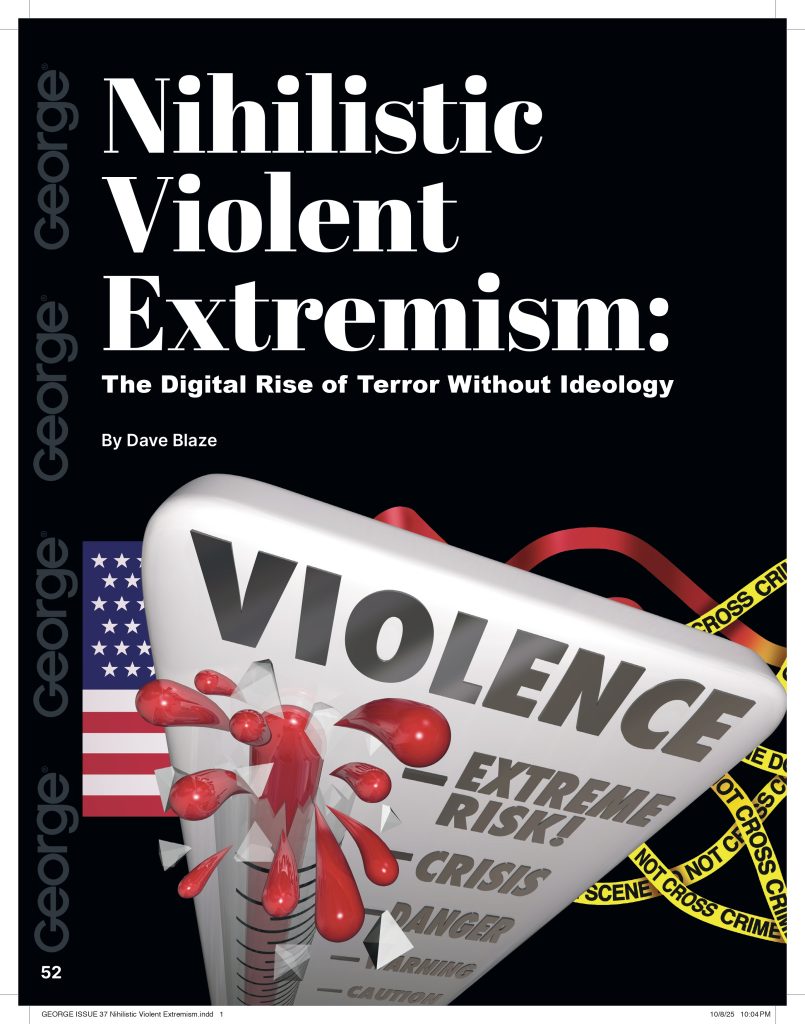Defining Nihilistic Violent Extremism
NVE is characterized by a rejection of all moral, political, and social values. Its adherents are not motivated by coherent ideologies but by a deep hatred of society and a desire to see it destroyed. These individuals or groups often glorify violence for its own sake, seeking notoriety, clout, or emotional catharsis through acts of destruction. As the Institute for Strategic Dialogue (ISD) notes, NVE represents “terror without ideology,” where violence becomes a symbolic rupture rather than a strategic act.
Subcultures such as the True Crime Community (TCC) and No Lives Matter (NLM) exemplify this phenomenon. TCC fans idolize mass shooters, replicating their aesthetics and behaviors, while NLM operates as part of the 764 network, promoting misanthropy and glorifying violence without ideological justification.
The Digital Battlefield: How Networks Form
Social media platforms have become fertile ground for the formation and expansion of NVE networks. These groups thrive in anonymous, decentralized environments where aesthetics, memes, and coded language replace traditional ideological indoctrination. Platforms like Telegram, Discord, Tumblr, and fringe forums host communities that venerate past attackers, share violent content, and recruit vulnerable youth.
The ISD investigation reveals that these networks often overlap with ideologically motivated extremist groups, borrowing symbols and language without adopting their core beliefs. This aesthetic convergence complicates detection and intervention, as attackers may appear ideologically motivated but are actually driven by nihilistic impulses.
Dr. Gerard Gill’s analysis using Significance Quest Theory explains how individuals deprived of meaning seek significance through violent acts. In the absence of ideology, the desire for status, belonging, or emotional release becomes the primary motivator. This theory is particularly relevant in the context of digital radicalization, where online communities offer validation and notoriety to those who commit or glorify violence.
Government Recognition and Response
The FBI’s formal recognition of NVE marks a significant shift in counterterrorism strategy. In his September 2025 testimony, FBI Director Kash Patel reported a 300% increase in domestic terrorism investigations related to NVE, highlighting its rapid growth and the agency’s commitment to addressing it. Patel emphasized the need for transparency, interagency collaboration, and public engagement to combat this emerging threat.
Congressional testimony before the House Subcommittee on Counterterrorism and Intelligence further underscores the urgency. Daniel Flesch of the Heritage Foundation described how foreign and domestic actors exploit digital platforms to radicalize Americans, often using graphic content and encrypted messaging apps to bypass detection. The testimony also linked NVE to antisemitic and anti-American rhetoric, particularly in the wake of the October 7th Hamas attacks, illustrating how global events can catalyze domestic radicalization.
Legal Tools: Can RICO Be Applied?
The Racketeer Influenced and Corrupt Organizations (RICO) Act, originally designed to combat organized crime, allows prosecutors to target individuals or groups engaged in a pattern of racketeering activity as part of an enterprise. The statute has been used against street gangs, white-collar criminals, and even extremist groups when they function as coordinated entities.
Can RICO be applied to NVE networks? Potentially, yes…if prosecutors can establish that these decentralized online communities operate as enterprises engaged in criminal activity. The Justice Department has already charged members of the 764 network with operating an international child exploitation ring, suggesting that such groups can be treated as criminal enterprises. If NVE collectives coordinate attacks, share tactics, or engage in criminal conspiracies, they may meet the criteria for RICO prosecution.
However, challenges remain. NVE networks often lack formal hierarchies or identifiable leadership, making it difficult to prove enterprise-level coordination. Their decentralized nature and reliance on anonymity complicate attribution and legal accountability. Yet, as the ISD report notes, some groups like NLM adopt cellular structures and produce propaganda, which could support a RICO case.
Targeting Radicals Who Seek the Destruction of the U.S.
Radicals who advocate for the destruction of the United States, its institutions, and its banking system may fall under the NVE designation if their motivations are nihilistic rather than ideological. The Homeland Security testimony describes how certain protest movements, under the guise of political activism, promote violent revolution and the collapse of Western civilization. These actors often use coded language and encrypted channels to coordinate activities, blurring the line between political dissent and violent extremism.
If such individuals or groups engage in criminal conspiracies, provide material support to designated terrorist organizations, or incite violence, they may be prosecuted under existing terrorism statutes. If they operate as part of a network that meets the criteria for a criminal enterprise, RICO could be invoked. The key distinction lies in motivation: if their actions are driven by misanthropy and a desire for destruction without a coherent political goal, they align with NVE.
Challenges in Detection and Prevention
One of the most troubling aspects of NVE is its ability to evade traditional counterterrorism frameworks. Without ideological markers, law enforcement may struggle to identify radicalization pathways or predict attacks. As the ISD report notes, some attackers were referred to prevention programs multiple times but dismissed due to the absence of ideological indicators.
Moreover, the aesthetic and performative nature of NVE complicates detection. Violence becomes a form of expression, a way to assert existence in a meaningless world. This symbolic rupture is often staged for maximum virality, making social media both a recruitment tool and a stage for violent spectacle.
The VOX-Pol analysis highlights the role of “mixed, unclear, and unstable” (MUU) belief systems in NVE, where digital subcultures provide the emotional and aesthetic infrastructure for radicalization. These environments foster existential despair, social isolation, and a crisis of meaning…conditions that traditional law enforcement tools are ill-equipped to address.
Recommendations for Government Action
To combat NVE, the U.S. government must adopt a multi-pronged approach:
-
Expand Legal Frameworks
- Consider applying RICO statutes to decentralized networks that coordinate criminal activity.
- Update terrorism definitions to include non-ideological motivations rooted in misanthropy and nihilism.
-
Enhance Digital Surveillance
- Monitor fringe platforms and encrypted channels for signs of NVE activity.
- Collaborate with tech companies to identify and remove harmful content, while respecting civil liberties.
-
Invest in Public Health Approaches
- Address underlying vulnerabilities such as mental health, social isolation, and digital illiteracy.
- Support community-based programs that foster belonging and offer alternative sources of significance.
-
Improve Prevention and Intervention
- Train law enforcement and educators to recognize signs of NVE radicalization.
- Develop off-ramps and referral pathways for individuals exhibiting concerning behaviors.
-
Promote Digital Resilience
- Encourage digital literacy and critical thinking to counteract the appeal of violent aesthetics.
- Support initiatives that reclaim online spaces for positive engagement and meaning-making.
So, What Does it All Mean?
Nihilistic Violent Extremism represents a new frontier in domestic terrorism…one that defies traditional ideological boundaries and thrives in the digital shadows. Its rise across social media platforms signals a deeper cultural and existential crisis, where violence becomes a perverse form of self-expression and significance. While legal tools like RICO offer potential avenues for prosecution, combating NVE requires a broader societal response that addresses the emotional, psychological, and digital roots of despair. The challenge is not just to disrupt networks, but to restore meaning in a world increasingly defined by fragmentation and crisis.
References
“Expert explains nihilistic violent extremism,” Yahoo News, Sept 15, 2025.
“The Digital Battlefield,” Testimony before the House Subcommittee on Counterterrorism and Intelligence, March 4, 2025.
Mark Peden, “Nihilistic and Apocalyptic Violent Extremism,” VOX-Pol, July 29, 2025.
FBI Director Patel’s Opening Statement to the Senate Judiciary Committee, Sept 16, 2025.
“Terror Without Ideology,” ISD Investigation, May 8, 2025.
Dr. Gerard Gill, “Significance Quest Theory and Nihilistic Violent Extremism,” GNET, July 18, 2025.










